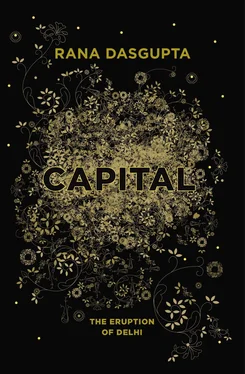Sadia’s remark about legal processes also says much about the currents from which she has emerged. In the wake of its arrival, British law was regarded by the Mughal establishment as a foreign, godless and illegitimate imposition, and Sufi mystics instructed their followers that they had no moral responsibility to tell the truth in British courts. Sadia’s family seems to have lived ever since on the leeward side of this historical breach.
The strength of feeling directed against the British legal system, and the fact that it never secured widespread assent in north India, had to do, indeed, with its failure to acknowledge such local sources of moral authority as the Sufis. Part of the social power of Sufism in the Mughal period derived from the fact that it acted as a democratising political force: Sufi saints enjoyed such popular prestige that they could act as a curb on the unfettered power of the Mughal throne. Emperors consulted them on ethical and political matters, and were reluctant to go against their word, which carried the force of the universal. In this way was established a recognisably consensual mechanism for just rule, in what was otherwise a dictatorship.
More recent legal systems, from the British onwards, have of course provided less space for such kinds of intermediaries. And still today, when the political and legal establishment is often seen as corrupt, self-serving and removed from the needs of ordinary people, there is a widespread hankering for fearless, saintly figures who might speak to rulers with cosmic authority, and change everything in a word.
“When I grew up, our house was always full of music and poetry. My family ran a publishing house: we published many magazines in Urdu and Hindi, including a famous Urdu cultural magazine called Shama ; it had a huge circulation and we were very well-known. We had a beautiful bungalow where all the poets and film stars used to come. There was no cultural figure of any importance who did not spend time at our house. Writers and artists like Ismat Chughtai, Qurratulain Haider, Amrita Pritam, Faiz Ahmed Faiz, Gulzar, M.F. Hussain, Satish Gujral, and many others. Films stars such as Nargis Dutt, Raj Kapoor, Meena Kumari, Dilip Kumar, Dharmendra…
“With the collapse of Urdu, our magazines folded one by one. We sold our ancestral home some years ago. That was the house my family settled in when they came from the old city; it was the house where I was born. It was bought by Mayawati, the chief minister of Uttar Pradesh.
“I am not interested in trying to revive the family business. That era has gone. I am happy with my own. I am happy to focus on what is inside me and to write on spirituality. Ours is a wonderful city, a modern city: I don’t want to be negative. But our soul is affected. Something has snapped. I can’t identify it.”
And indeed perhaps it is unidentifiable, this thing that has snapped. Perhaps it derives not from an event but from some condition of the city, this feeling that everything meaningful has already been destroyed — for Sadia’s lament is almost comically similar in content to those of Ghalib a century and a half before.
“How do you expect Delhi to care about its own history when no one can read the languages it is written in? Its entire history is written in Urdu and Persian. The government deliberately killed Urdu after 1947 because they treated it as a Muslim language. But Urdu had nothing to do with religion: it was the language of Delhi, of everyone in Delhi. Pakistan took Urdu for its national language, but Urdu did not originate in any region of Pakistan. I mourn the loss of the language more than anything else. When you want to destroy a people, you take away their language.
“Delhi people used to be very particular about beautiful language. They were fond of poetry and they had real poets. Delhi used to be about beautiful cuisine. It used to be gentle. It was about beautiful living. When the rains began, the shopkeepers shut their shops and went out to enjoy the weather in the open spaces in Mehrauli. They made time for good food. They loved pigeon racing and listening to the storytellers on the steps of the Jama Masjid. They had few marketing skills, which is why they died out. They believed in exquisiteness: they made carpets and furniture, they worked as bookbinders. In Urdu, we call it ‘saleeqa’, a refined sensibility.”
As Ghalib was, Sadia is greatly preoccupied by the uncultivated outsiders, those without any care for such a sensibility.
“The first blow to Delhi’s culture came with the British, and then with the influx of Punjabis who came in after Partition. The original people of Delhi did not know what hit them after 1947: they were completely rattled by the loudness, aggression and entrepreneurship of the migrant Punjabis. My parents were shocked: ‘Where have they come from, these people? Why are they so loud? What is this food they eat?’ They tried to preserve the pre-1947 culture. They constantly corrected our language. ‘We have a language,’ they used to say. ‘We have a refined language. We have to use it.’ Punjabis took all the land of the city, they killed its language and etiquette. They ate tandoori chicken and butter chicken. Butter chicken! Those were things that I only saw outside our house, never inside.
“Of course, later on I became more receptive to other cultures. But I am glad that I was brought up in the old Delhi culture, because it was a good culture. It was a culture of hospitality. Giving water to anyone who came to your door. Giving up your own room for your guests, feeding them well, giving them shawls to wrap themselves in.
“Partition devastated the city, damaging its ethos forever. Look at our fabulous monuments: apart from the five or six that have been identified as tourist spots, the rest are just falling down. They’re garbage dumps. Hardly anything of beauty has been made since Partition. Look at the five-star hotels. You need to be beautiful to create beauty, and I don’t think people have that inner beauty anymore. Now our city is about aggression, rage, inequality, corruption and personal gain. It’s about consumerism and shopping malls. There is little space to reflect and polish the heart. We have no beauty to leave to our children.”
The walls of this room are covered with paintings of Urdu calligraphy. Sadia’s teenage son practices music in the other room: medieval Sufi music that he updates on his guitar. Sadia speaks quickly, switching between Urdu and English, her sentences falling over each other because she has rehearsed them many times in her head.
“I used to enjoy going to parties, because people used to be more genuine. Today you have people looking over your shoulder, talking to you but wondering all the time who they need to give their card to. I don’t associate with networking culture. And real prejudices have come to the surface since 9/11. At first I thought I was being too sensitive, but I wasn’t. I saw it in people who were part of my own circle of friends. It’s difficult to meet them now because inside they have a deep bias against Muslims. They say truly bizarre things these days. They want to know why we can’t stop being so Muslim .”
Two of Sadia’s friends from Pakistan, a couple, are sitting in the room with us. The husband runs a company that makes facsimiles of Mughal jewellery, which are fashionable in Pakistani society. The craftsmen who can still make them are not in Pakistan, however, but in India, and he comes frequently to work with them.
“My friends went to a party last night,” says Sadia. “And some Punjabi woman met them — she was Punjabi, wasn’t she? — yes, and she said she was scared of Pakistanis and they said to her, ‘Why don’t you come to Pakistan?’ And she said, ‘No we’re too scared. Someone might let a bomb off in your house.’ And she started laughing. ‘And our husbands would never let us stay among Pakistani men!’ And I said how can anyone allow that type of conversation with a guest? I mean, it is most inelegant! If someone had said that in my house, I would have said, ‘I’m sorry, you cannot talk like that to my guest!’”
Читать дальше











